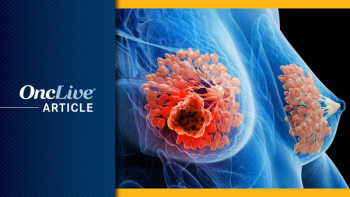
Liquid Biopsy and Next-Generation Sequencing
Transcript:
Geoffrey R. Oxnard, MD: I think the question we as clinicians need to be ready with is, how many of these tests are we willing to offer for our patients? I know that my pathologists, for example, are willing to offer 1 tumor EGFR testing assay. And 2 years ago, that was a rapid EGFR test, and this year that’s an NGS panel. They say, “Look, we can offer you 1 test, pick which test you want.”
On the liquid biopsy side, I have a couple of these kits sitting around, and I pick which kit for which patient. So, when I want a rapid result, I’m sending a rapid EGFR PCR assay to Brigham and Women’s Hospital—my hospital—to get a result in a couple of days. If I have a couple more weeks and I want a more comprehensive test, I’m sending plasma NGS. I have a staff that has the flexibility to be able to have the different requisitions and different kits available. I’ve certainly sent a patient to another provider to say, “Here’s my recommendation, send a quick EGFR, get that back in a couple of days, and use that to make your next decision.” And they said, “How do I send a quick EGFR?” They just didn’t have that kit sitting in their clinic.
And so, practically in the community, it might be that you need to have just 1 of these boxes laying around, and that’s your go-to box that your lab is familiar with. If you’re going to offer 1 test, it’s probably got to be an NGS panel. But I think the better approach is to recognize the diversity, recognize that there are different tests for different needs, and have a go-to EGFR assay, like the FDA-approved EGFR assay that gives a rapid reliable test when you need it, and an NGS panel available when you need to cast a broad net, but you have a couple weeks available to get that result back before you use it to make decisions.
Sandip Patel, MD: Larger gene panels are helpful in the right clinical context. And so, for a patient who’s a never-smoker with non—small cell lung cancer, a larger gene panel may discover an occult driver mutation for which we either have a clinical trial or an effective, standard-of-care targeted therapy. And so, typically at diagnosis, I tend to order a larger gene panel, tumor-based NGS, but also a liquid biopsy in the right clinical context. Clinical trial enrollment is important for many patients who have driver mutations for which there’s not an existing targeting therapy available. For these patients, particular larger gene panels can be of importance. Another role larger gene panels play is in determining resistance to various targeted therapies. And so, larger gene panels not only uncover mutations in the specific gene of interest but potentially related genes that may be affected that would be missed on smaller panels. These can be crucial in cataloging disease resistance, but more importantly in helping a specific patient by determining their particular mechanism of resistance and how we can best intervene in their favor with the targeted therapeutic approach.
For a patient who has a rare mutation that is incompletely characterized, these are ideal candidates for referral to academic or tertiary medical centers, where a molecular tumor board can utilize their expertise to help discern whether or not a mutation is real, whether it’s a real genomic call, and whether or not that mutation has a biologic significance, such that therapy with a targeted agent or a clinical trial may be appropriate for that patient. And so, I think this in particular is a strength for molecular tumor boards. I think this has actually become more and more common as we start to have larger panels. Rather than not detecting mutations, we’re going to start detecting mutations we know less about. For these patients in particular, having the ability to go to molecular tumor board and have their tumor profiled by experts in the molecular biology of their specific cancer, such that they can discover whether or not a targeted approach may be beneficial to them, is going to become increasingly common as the utilization of larger panels continues.
Larger gene panels are able to survey a wider swath of DNA, and so a patient may have multiple actionable mutations that are detected. I think for patients, especially never-smokers or patients who have a unique tumor or rare tumor, surveying a wider number of genes will uncover multiple potential therapeutic possibilities. One other particular aspect, especially once we get into whole exome-based approaches, is the ability to look at a patient's specific cancer, make neoantigen calls, and potentially select tumor infiltrating lymphocyte therapy or cellular immunotherapy based on their specific antigens—based on their specific HLA type. And so, when thinking about a much broader panel in potential future use, the use of these panels for immunotherapeutic prediction, as opposed to targeted therapy treatment assignment, may be one of the roles of this type of testing in the future.
At the current time, the difference between a variant of unknown significance—either by tumor-based NGS or cell-free DNA-based approaches—versus not detecting that specific gene based on a smaller panel is not substantial in terms of targeted therapeutic selection. However, the ability to use these types of assays for immunotherapeutic prediction based on calculations of tumor mutational burden is likely enhanced by the ability to detect more genes. And so, the ability to detect a variant of unknown significance is effectively a proxy for how good the sequencing technology is at making variant calls, at detecting more genes and more aberrations. And, as the technology continues to improve, the ability to detect DNA that’s shed from smaller tumors—as well as detect a number of aberrations that may be pertinent for immunotherapy—will increase over time.
Transcript Edited for Clarity




































